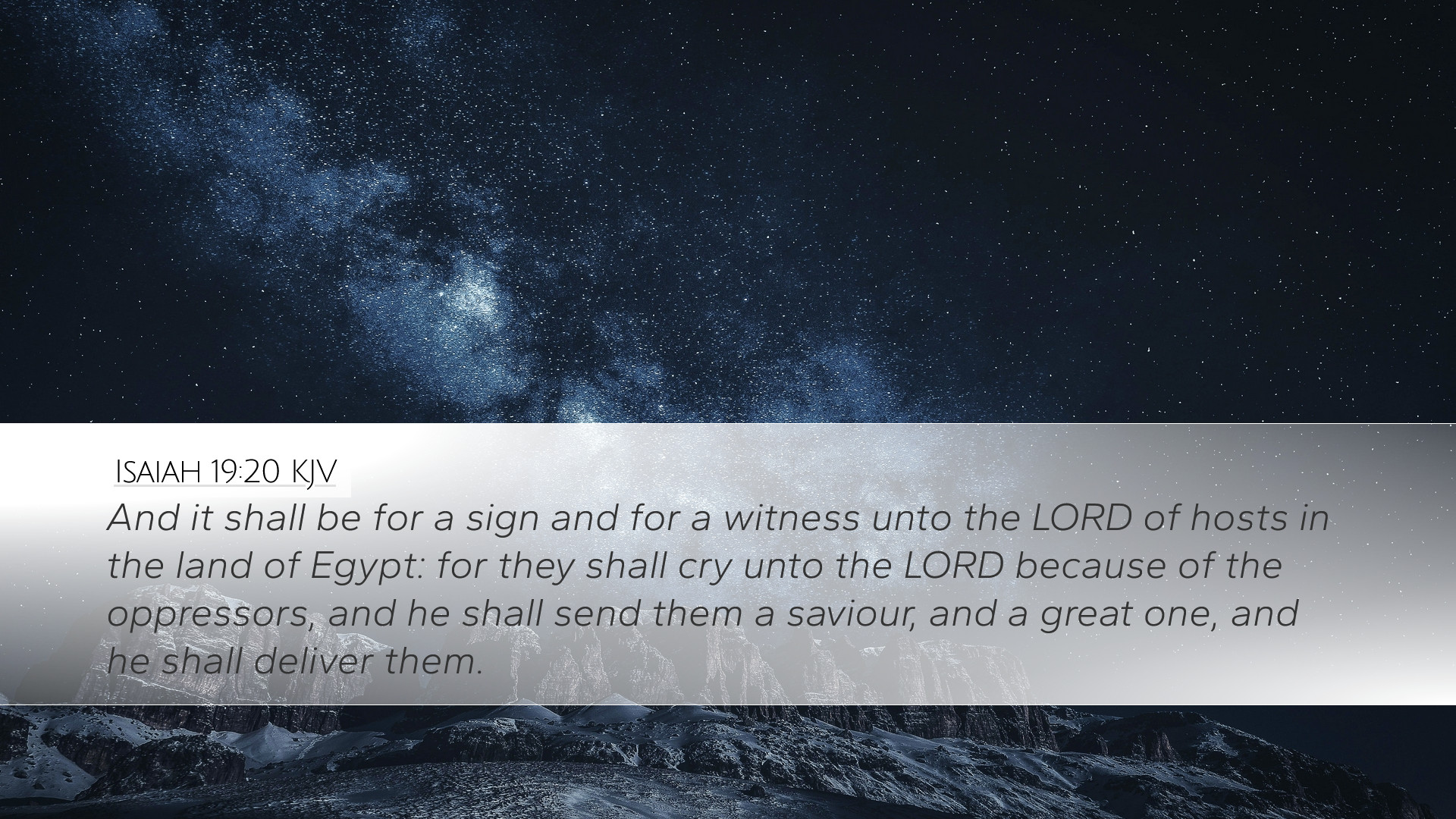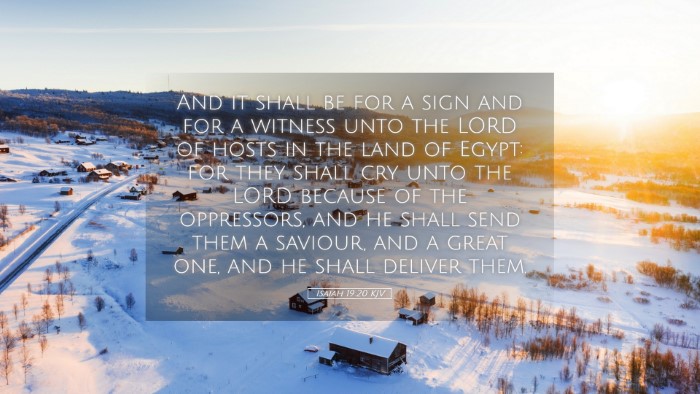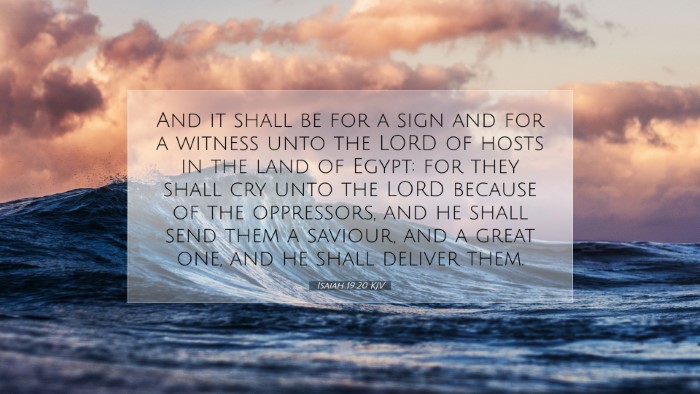Commentary on Isaiah 19:20
Isaiah 19:20 (KJV): "And it shall be for a sign and for a witness unto the Lord of hosts in the land of Egypt: for they shall cry unto the Lord because of the oppressors, and he shall send them a saviour, and a great one, and he shall deliver them."
Introduction
This verse stands as a profound promise amidst a prophecy concerning Egypt’s future. It outlines God's intentional plan to protect and deliver His people, revealing His mercy even towards nations historically opposed to Israel. The unity of God's character—judgment and mercy—shines through, offering deep insights for theologians, pastors, and congregants alike.
Contextual Background
The backdrop of Isaiah 19 encompasses impending judgment against Egypt due to their idolatry and oppression. Isaiah’s message is vividly clear; however, intertwined with the judgment is a prophetic hope for redemption. The prophetic tradition often holds a dual aspect; a faithful remnant can be found even in the darkest times.
Detailed Exegesis
“For a sign and for a witness”
Commenting on this phrase, Matthew Henry notes that this declaration serves not only as a herald of judgment but also as a beacon of truth. The sign delineates divine intervention, exemplifying God's sovereignty over nations. A witness signifies the work of the Lord that is recognizable to people as a testament to His power and grace.
“In the land of Egypt”
In this context, Egypt often symbolizes the world and oppression. Albert Barnes highlights that God’s concern extends beyond Israel, revealing His universal dominion. Even in Egypt, a hardened nation for its resistance to God, there is a promise of divine restoration. The mention of Egypt here accentuates God's mercy to the nations and reinforces a theological understanding of grace among Gentiles.
“They shall cry unto the Lord because of the oppressors”
Here, the exclamation points to the expected anguish due to foreign oppression. Adam Clarke elaborates that this cry is characteristic of those who recognize their plight and turn to God for deliverance, emphasizing the covenantal aspect of His relationship with humanity. This moment of desperation is a pivotal point of transformation, illustrating how struggles can propel individuals and nations toward divine appeal.
“He shall send them a saviour, and a great one”
The reference to a savior foreshadows greater truths found in the New Testament. Matthew Henry connects this to the ultimate Savior, Jesus Christ, interpreting this verse as prophetic of the coming Messiah who will not only deliver but also restore. This savior carries the burden of leadership and compassion, promising a profound restoration of both physical and spiritual stature.
“And he shall deliver them”
Albert Barnes emphasizes that the promise of deliverance is not merely for individual salvation but includes the collective restoration of the nation. This comprehensive understanding stresses God's desire to redeem nations, fostering a theological framework for missionary efforts. It beckons scholars to consider how this promise does not initiate and end within cultural confines but invites all nations into God’s redemptive plan.
Theological Implications
The rich tapestry woven within this single verse elucidates several significant theological tenets:
- Grace Beyond Idolatry: This promise to Egypt signals God's grace even where idolatry once reigned. It provides a paradigm for understanding grace as a powerful transformative force that extends to all who seek Him.
- Global Redemption: This prophecy challenges exclusivist narratives within theology, presenting God as an inviting figure, approachable to nations beyond Israel. It instills hope in a redemptive history that culminates in Christ.
- Hope in Despair: The imagery of crying out to the Lord suggests a powerful motif of hope followed by divine intervention. It serves as an encouragement, emphasizing that in despair, individuals can find themselves in a space conducive to divine rescue.
Practical Applications
Pastoral and scholarly interpretations of Isaiah 19:20 yield numerous practical applications:
- Encouragement in Trials: Both individuals and congregations may find solace in the idea that God hears cries from the depths of oppression. This verse can be employed in sermons to remind believers of God's faithfulness during difficult seasons.
- Awareness of Global Context: The themes within Isaiah 19:20 can foster a broader understanding of the church’s role in addressing global injustices, urging the faithful to engage socially and spiritually with those oppressed across the world.
- Hope in Evangelism: The promise of salvation to the nations infers that all cultures are seen and valued by God. It offers both a challenge and an encouragement for believers to share their faith with all groups, echoing God's inclusive love.
Conclusion
Isaiah 19:20 is layered with profound theological insights that resonate across generations. The interplay of judgment and mercy, the foretelling of a Savior, and the promise of deliverance constitute a message that is not only historical but also eternally relevant. For pastors, students, and theologians, this verse stands as a reminder of God’s unwavering presence and intent in the world. It calls believers to active participation in the redemptive narrative that spans cultures and generations, framing a future filled with hope and divine promise.


